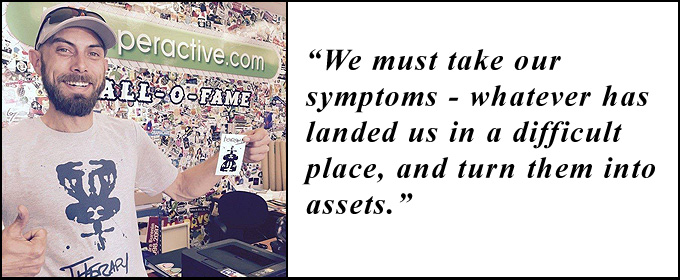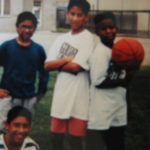Instruments of Peace: Converting Failures into Assets
It can seem rare in today’s world, where we are inundated with negativity on a mass scale, to find people that are truly about a righteous mission. But…in my experience, when you look for them, you will find them. And let me tell you, Joshua Keith is not just one of these people…he searches for them and cultivates them for the betterment of our world.
Chalked full of “hittin’ ‘em in the mouth,” eye-opening, “take-a-step-back-and-listen-to-me-NOW”, language, Josh says,
“You see a car thief, I see a resourceful person that can do things quickly, and is highly motivated…thing is, he values his skill, but he doesn’t value his life. And so I ask the question, ‘why?’ ”
BAM! ![]() Talk about getting down, dirty, and raw with the core of our human existence. Where many of us see an opportunity to judge, castigate, and throw stones, Joshua sees opportunity for growth and harnessing the drive–the unstoppable energy we all possess–and finding ways to direct it into something positive. Want some of that energy? Me too, so I had to share. Keep reading…
Talk about getting down, dirty, and raw with the core of our human existence. Where many of us see an opportunity to judge, castigate, and throw stones, Joshua sees opportunity for growth and harnessing the drive–the unstoppable energy we all possess–and finding ways to direct it into something positive. Want some of that energy? Me too, so I had to share. Keep reading…
Cashing in failures
Joshua possesses the drive and curiosity we all had as children, and implements change from the perspective of a man who once let failure define him. At some point in our lives, if we are work for it, it’s as if we walk through a portal of self-perception, where we start to recognize our failures as opportunities. Josh sprinted through that portal, and hasn’t looked back.
At this point in these types of articles, authors usually enumerate the subject’s many struggles, and how they led that person to where they are. Don’t get me wrong, Josh has been there, from serving time in prison, to battling with addiction and the criminal justice system. If you’d like to know more, read his story here. I’m more interested in sharing his philosophy and solutions with you.
“There’s this misconception that you are somehow chosen to be successful, and so many people just sit around waiting,” says Josh. “And we are so conditioned to be fearful, with few encouraging statements.” This sentiment comes from a man who for some time, was emotionally and financially tied to the justice system. He says, “Our world…our society…isn’t setup for second chances.” And so Joshua has become and now offers these second chances and alternative perspectives to those in need.
Creating assets
This year, Joshua founded Therapy DISCgolf, an Austin, Texas-based organization that works with young people to “take their symptom – whatever has landed them in a difficult place, and turn it into an asset.” Using Discgolf as a vehicle, the organization gives our youth a place to learn about making decisions, while instilling in them with emotional and mental tools to face adversity.
 Having had my own battles with addiction, Joshua’s words struck me when he said,
Having had my own battles with addiction, Joshua’s words struck me when he said,
“A lot of people who find themselves in drug and alcohol addiction and crime – they can be driven to do things that other people will not do. To me, that demonstrates the capacity for commitment and action. When you think about it…what is the difference between the person searching for the cure for cancer, and the Unabomber…other than a moral compass?”
This is the reality that so many of us refuse to acknowledge: each of us possesses a drive…a compulsion, if you will. It’s simply a matter of how we utilize it. Therapy DISCgolf not only acknowledges this drive, but it also teaches self-forgiveness and shows compassion where society otherwise admonishes. In many ways, Therapy DISCgolf is an embodiment of the words of the Prayer of St. Francis.
While Joshua attributes his values to his parents, he acknowledges the unpredictability of the human element. He says, “Any person that has been to prison and was able to survive it and retain some level of humanity has an edge…and…because I am conscious of my talents and my ability to influence, I have a responsibility to use them in a positive way.” He draws encouragement and inspiration from corresponding with other Discgolfers around the world. He strives to give others the message that we all possess what we need to succeed; we must simply engage our strengths and relinquish placing blame externally.
Often times in our society, we are told what we should think, what we should feel, how we should worship, and which values we should embrace. We overcomplicate ideologies and theologies with our personal agendas, colored by our experiences and perceptions. Let’s get back to the fundamental concept of “loving thy neighbor as thyself.”
Get involved and be about change by subscribing now




























Comments No comments